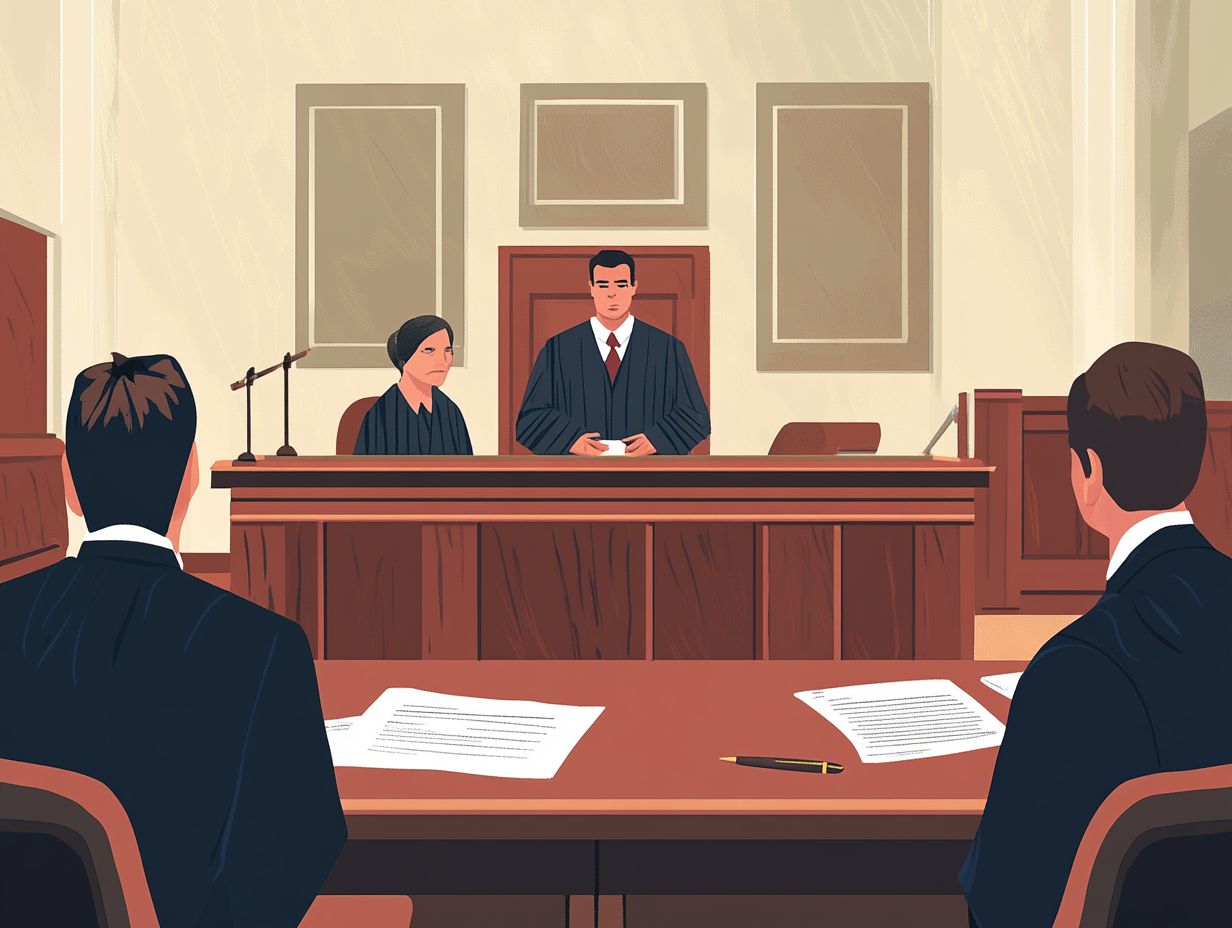The Ins and Outs of Plea Bargaining
Plea bargaining is a vital part of the criminal justice system. It allows you to negotiate charges and potential sentences.
This guide explains plea bargaining clearly, highlighting its pros and cons, while also covering various forms such as charge, sentence, and fact bargaining.
We will address factors that can influence these negotiations, including legal and ethical considerations. Additionally, we will explore alternatives to plea bargaining like jury trials and diversion programs.
Whether you’re new to the legal landscape or looking to deepen your understanding, this guide equips you with a thorough comprehension of the complexities and implications of plea bargaining.
Contents
Key Takeaways:

Plea bargaining is a process where the defendant agrees to plead guilty in exchange for a lesser sentence or the dropping of some charges. The advantages include faster case resolution and reduced court costs, but there are disadvantages such as potential injustice and coercion. Types of plea bargains include charge, sentence, and fact bargaining, each with specific outcomes for the defendant.
Understanding Plea Bargaining
Plea bargaining stands as a crucial element of the criminal justice system. It allows for the resolution of criminal cases through strategic negotiations between the prosecution and the defense attorney.
By presenting an option for a reduced sentence or lesser charges, defendants can sidestep the unpredictable nature of a trial. Prosecutors can achieve guilty pleas, enhancing trial efficiency and boosting conviction rates.
This legal maneuver helps simplify the court process. In a plea deal, the defendant consents to plead guilty in return for more favorable terms, ultimately serving the interests of both parties within the judicial framework.
Definition and Process
A plea bargain is an agreement where you, as a defendant, offer a guilty plea in exchange for certain concessions from the prosecution. This helps streamline the trial process and eases the burden of overwhelming trial backlogs while giving you a chance for reduced sentences or lesser charges.
Negotiations typically begin when your legal counsel communicates your desire to explore this option with the prosecution. Various factors can influence the outcome, including the severity of the alleged crime, the strength of the evidence against you, and your criminal history.
It s essential to have a skilled attorney by your side! They can negotiate the best terms for you. Understanding your rights is crucial; a guilty plea can carry significant repercussions that may affect your future employment opportunities and personal life.
This underscores the importance of knowledge-based decision-making during this critical stage.
Pros and Cons of Plea Bargaining
Plea bargaining offers a blend of advantages and disadvantages that can profoundly influence defendants, victims, and the judicial system as a whole.
Advantages and Disadvantages
The advantages of plea bargaining include higher conviction rates and the possibility of diversion programs, which can be beneficial for you as a defendant and for public defenders alike.
Plea deals can save valuable court time and alleviate the overall burden on the legal system, leading to significant cost savings for taxpayers. When you accept these agreements, you often receive lesser sentences, enabling a quicker reintegration into society.
However, these approaches may raise concerns about potential infringements on your constitutional rights. Critics argue that the pressure to accept a plea can lead to wrongful admissions of guilt, fostering a sense of injustice within the community.
The risk of coercion could disproportionately impact vulnerable individuals who might feel they have no choice but to concede. This ultimately casts doubt on the fairness of the judicial process.
Types of Plea Bargains

Plea bargains come in several distinct types, each designed to serve specific purposes during the negotiation process within the realm of criminal law.
Understanding these categories can significantly enhance your strategic approach to legal negotiations.
Charge Bargaining
Charge bargaining allows you to negotiate for a lesser charge. This gives you the opportunity to plead guilty to a reduced offense and avoid more severe penalties. This practice streamlines court proceedings and significantly impacts conviction rates.
When engaging in charge bargaining, carefully consider the strength of the evidence against you and the risks of going to trial. For instance, in a high-profile case involving serious charges related to drug trafficking, negotiating a lesser charge for possession led to a swift conclusion for both prosecution and defense.
Such scenarios illustrate how plea negotiations can lead to lesser penalties while alleviating the burden on the judicial system. They underscore the crucial role that the strength of the evidence plays in determining the fairness and outcomes of these negotiations.
Sentence Bargaining
Sentence bargaining is a negotiation where you agree to plead guilty in exchange for a reduced sentence during your hearing. This process is crucial in the criminal justice system, allowing you to sidestep harsher penalties while helping prosecutors resolve cases efficiently.
During a court evaluation, various factors come into play, including the nature of your crime, your criminal history, and the strength of the evidence against you. These elements are vital in determining whether a plea agreement will be accepted and will ultimately influence your sentencing outcome.
By opting for a plea deal, you might face more lenient sentences compared to what you would receive if found guilty at trial. This highlights the intricate relationship between plea agreements and their impact on judicial decisions.
Fact Bargaining
Fact bargaining allows you to negotiate the specifics of the facts presented in court, potentially influencing the trial’s outcome.
By skillfully crafting the narrative of your case, you can create a favorable context for your circumstances, which may lead to a more lenient response from the jury.
This maneuver lets you shape jurors’ perceptions, guiding their focus toward negotiated elements instead of the broader implications of the crime.
As a result, the risk of a hung jury can increase when opposing sides struggle to agree on the fundamental facts. This illustrates the vital role of fact bargaining in influencing the jury’s decision-making and the overall dynamics of criminal proceedings.
Factors Affecting Plea Bargaining
Several factors shape the dynamics of plea bargaining, including both legal and ethical considerations that you, as a defense attorney or prosecutor, must navigate throughout the negotiation process.
Legal and Ethical Considerations

Legal and ethical considerations in plea bargaining require you to balance the rights of defendants with the interests of victims. This creates a complex challenge, where ensuring fair treatment for your clients sometimes clashes with a system prioritizing quick resolutions over true justice.
You need to navigate the intricate landscape shaped by case law, particularly the pivotal decision in Santobello v. New York, which emphasizes the need to honor promises made during plea negotiations.
By advocating for your clients while considering the impact on victims, you uphold the integrity of the legal process. Your advocacy demonstrates a commitment to justice and emphasizes the ethical dimensions of representation, even amid broader systemic pressures.
Alternatives to Plea Bargaining
While plea bargaining is a common method for resolving criminal cases, several alternatives exist for defendants who wish to uphold their legal rights.
Trial by Jury
Trial by jury is a cornerstone of the legal system. It allows a group of your peers to determine the guilt or innocence of a defendant based on the evidence presented during criminal trials.
This process safeguards individual liberties and embodies the community’s collective judgment.
In these trials, the jury reviews testimonies, scrutinizes physical evidence, and listens to legal arguments from both the prosecution and the defense.
Their role is to assess the facts impartially and render a verdict that reflects their understanding of the truth.
A jury’s verdict carries the weight of public scrutiny, leading to either an acquittal or a conviction. This dynamic highlights the balance between justice and injustice.
Diversion Programs
Diversion programs offer a compelling alternative to traditional criminal processing. They emphasize rehabilitation and community service to address the root causes of criminal behavior.
These programs help keep people out of the legal system, fostering positive change without the burden of a criminal record.
Unlike plea bargaining, which often resolves cases quickly through guilty pleas for leniency, diversion programs focus on personal growth and reintegration into society.
Examples include drug courts and youth restorative justice initiatives. They provide guidance and support while enhancing community safety by tackling the root causes of crime.
This proactive approach can dramatically lower the chances of reoffending, making our communities safer!
Frequently Asked Questions
What is plea bargaining?

Plea bargaining is a legal negotiation process. In this process, the defendant agrees to plead guilty to a lesser charge or to receive a reduced sentence in exchange for a more lenient punishment.
Who is involved in the plea bargaining process?
The defendant, the prosecutor, and the defense attorney are all involved.
What are the benefits of plea bargaining?
Plea bargaining allows for a quicker resolution to a case, reduces the burden on the court system, and can result in a lighter sentence for the defendant.
What are the potential drawbacks of plea bargaining?
Some drawbacks include the risk of innocent defendants pleading guilty, unequal bargaining power between the prosecution and defense, and a lack of transparency in the criminal justice system.
How common is plea bargaining?
Plea bargaining is very common, with an estimated 90-95% of criminal cases in the United States resolved through this method.
Can a plea bargain be revoked?
In some cases, a plea bargain can be revoked if the defendant feels they were coerced or misled. However, revocation may require court approval and is not always possible.






